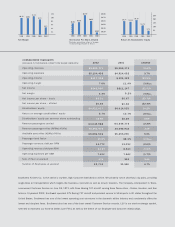Southwest Airlines 2002 Annual Report Download - page 21
Download and view the complete annual report
Please find page 21 of the 2002 Southwest Airlines annual report below. You can navigate through the pages in the report by either clicking on the pages listed below, or by using the keyword search tool below to find specific information within the annual report.
2 | SOUTHWEST AIRLINES CO. 2002 10-K
PART I
Item 1. Business
Description of Business
Southwest Airlines Co. (“Southwest”) is a major
domestic airline that provides predominantly
shorthaul, high-frequency, point-to-point, low-fare
service. Southwest was incorporated in Texas
and commenced Customer Service on June 18,
1971, with three Boeing 737 aircraft serving three
Texas cities — Dallas, Houston, and San Antonio.
At yearend 2002, Southwest operated
375 Boeing 737 aircraft and provided service to
59 airports in 58 cities in 30 states throughout
the United States. Based on data for second
quarter 2002 (the latest available data),
Southwest Airlines is the fourth largest carrier i n
the United States based on domestic passengers
boarded and the second largest based on
scheduled domestic departures.
The business of the Company is somewhat
seasonal. Quarterly operating income and, to a
lesser extent, revenues tend to be lower in the
first quarter (January 1–March 31).
Southwest’s filings with the Securities and
Exchange Commission, including its annual
report on Form 10-K, quarterly reports on Form
10-Q, current reports on Form 8-K, and amend-
ments to those reports are accessible free of
charge at southwest.com.
Fuel
The cost of fuel is an item having significant
impact on the Company’s operating results. The
Company’s average cost of jet fuel over the past
five years was as follows:
Year Cost
(Millions)
Average Cost
per Gallon
Percent of
Operating Expenses
1998 $388.3 $0.46 11.2%
1999 $492.4 $0.53 12.5%
2000 $804.4 $0.79 17.4%
2001 $770.5 $0.71 15.6%
2002 $762.1 $0.68 14.9%
From October 1, 2002, through December 31,
2002, the average cost per gallon was $.71. See
“Management’s Discussion and Analysis of
Financial Condition and Results of Operations”
for a discussion of Southwest’s fuel hedging
activities.
Regulation
Economic. The Dallas Love Field section of the
International Air Transportation Competition Act
of 1979, as amended in 1997 (commonly known
as the “Wright Amendment”), as it affects
Southwest’s scheduled service, provides that no
common carrier may provide scheduled
passenger air transportation for compensation
between Love Field and one or more points
outside Texas, except that an air carrier may
transport individuals by air on a flight between
Love Field and one or more points within the
states of Alabama, Arkansas, Kansas, Louisiana,
Mississippi, New Mexico, Oklahoma, and Texas
if (a) “such air carrier does not offer or provide
any through service or ticketing with another air
carrier” and (b) “such air carrier does not offer for
sale transportation to or from, and the flight or
aircraft does not serve, any point which is
outside any such states.” The Wright Amendment
does not restrict flights operated with aircraft
having 56 or fewer passenger seats. The Wright
Amendment does not restrict Southwest’s
intrastate Texas flights or its air service from
points other than Love Field.
The Department of Transportation (“DOT”) has
significant regulatory jurisdiction over passenger
airlines. Unless exempted, no air carrier may
furnish air transportation over any route without a
DOT certificate of public convenience and
necessity, which does not confer either exclusive
or proprietary rights. The Company’s certificates
are unlimited in duration and permit the
Company to operate among any points within the
United States, its territories, and possessions,
except as limited by the Wright Amendment, as
do the certificates of all other U.S. carriers. DOT
may revoke such certificates, in whole or in part,
























